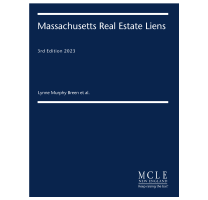Dear Subscriber:
Thank you for updating your library with the latest version of
Massachusetts Real Estate Liens
. This newly revised publication brings updated resources within
your immediate reach-for fast, accurate, and practical answers to your questions in this highly challenging area of practice.
Highlights from the 2023 edition include
-
discussions of liens imposed pursuant to G.L. c. 139, s. 3A (securing the reimbursement of costs incurred in removing or repairing unsafe or vacant properties);
-
a review of the provisions of G.L. c. 244, ss. 35A to 35C, establishing a ninety-day right to cure default; an opportunity to request
a loan modification; a codification of
Eaton v. Federal National Mortgage Ass'n
, 462 Mass. 569 (2012)
(requiring that a foreclosing mortgagee be the note holder or the authorized agent of the note holder); and a list of actions by
creditors that violate Chapter 244;
-
judicial interpretations of the obsolete mortgage statute;
-
foreclosure limitations imposed during the height of the COVID-19 pandemic;
-
references in mortgages to the statutory power of sale;
-
the standards for allowing additional postponements beyond an initial grant of relief from the automatic stay in bankruptcy;
-
the circumstances under which a statement of account must be recorded for a construction project;
-
the Supreme Judicial Court's determination that condominium associations may establish multiple, contemporaneous liens, each securing a separate six-month period of unpaid assessments and each with priority over all mortgages;
-
a First Circuit opinion addressing a condominium association's attempt to seek protection under the U.S. Bankruptcy Code;
-
potential preemption of state condominium law by federal housing and mortgage financing legislation and a finding by the U.S. District Court for the District of Massachusetts that it was "not apparent" that Massachusetts condominium law would be subject to preemption;
-
a Supreme Judicial Court opinion concluding that statutory deadlines applicable to mechanic's liens (and, by extension, condominium liens) were not tolled by COVID-19-related orders pertaining to court proceedings;
-
the extent to which a law firm representing a condominium association seeking unpaid common expenses may be considered a "debt collector" for purposes of the Fair Debt Collection Practices Act;
-
the issuance of Massachusetts Department of Revenue (DOR) Administrative Procedure 500 (Feb. 7, 2022), which addresses estate taxes and the release of tax liens;
-
a 2020 decision of the Supreme Judicial Court finding that MassHealth is subject to a three-year time limit (essentially a statute of repose) on filing claims for reimbursement of benefits received by the decedent; and
-
the standards applicable to the dissolution of a memorandum of lis pendens.
We trust you will find this updated version of
Massachusetts Real Estate Liens
an invaluable resource for your practice.
Very truly yours,
John M. Lawlor, Esq.,
MCLE Publications Attorney











